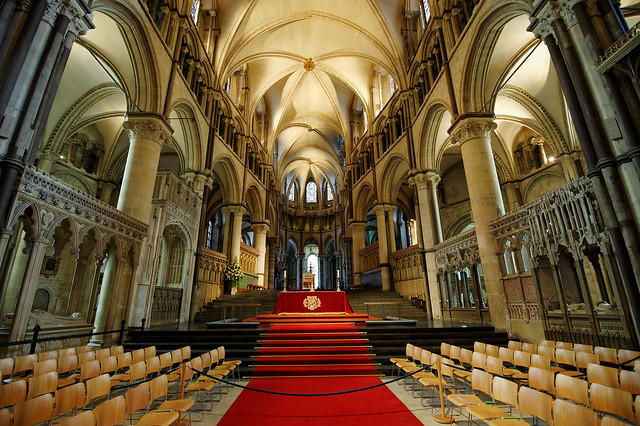
As archeologists dig through layers of dirt, they often rediscover long lost and forgotten treasures. Likewise, when we dig deep into the history recorded in the Bible, we can discover lost or forgotten truth. In today’s blog, I want to dig into the biblical history of the term “church.” What some will find surprising (but not those who regularly read our blog or listen to our podcast), is that the NT use of the term is grounded in Israel’s history. In fact, by calling themselves the church, NT followers of Jesus were staking claim to their inclusion and participation in God’s plan for Israel.
By the end of your reading you will see that contemporary usage of the word “church” has drifted significantly from its biblical meaning. It was certainly never meant to refer to buildings, whether simple or extravagant. Even the expression “going to church” reflects this drift.
Let me explain.
Defining the Term
The Greek word we translate “church” is ekklesia. According to the Louw & Nida Lexicon, the term designated a group of citizens assembled for socio-political activities. Likewise, the Liddell-Scott lexicon defines an ekklesia as an assembly of the citizens regularly summoned.
As you can see, the term has social and political implications. A group of people who were an ekklesia had certain things in common, both social and politically. These things set them apart as an identifiable national group. Simultaneously, this identification distinguished them from their neighboring nations.
Old Testament Usage
In the Old Testament, we frequently observe the phrase “assembly of Israel” or “congregation of Israel,” depending on your translation. In the Greek translation of the Old Testament, two different words were used in the phrase. One is ekklesia, which occurs approximately 100 times. The other is synagoge, which has a similar meaning to ekklesia. However, synagoge is a more generic term for “assembly.” It lacks the political implications. Synagoge is used over 200 hundred times for the “assembly of Israel.”
Second Temple Usage
At some point in the centuries before Jesus’ birth, Jews living in exile began to form synagogues. Unfortunately, we don’t have any direct evidence that explains the origins of the synagogues. In all likelihood, they arose out of the need for exiled Jews to assemble and worship together. Local synagogues were places of worship and teaching. Scripture was read every Sabbath, which helped them maintain their religious and cultural identity while living on foreign soil.
It’s possible that the term synagogue was adopted at least in part based on its OT use. In may have been short hand for “assembly of Israel.” Not only was it the more common OT term, it was also more generic. It lacked the political implications of ekklesia. Since these local assemblies had no political power, ekklesia may have seemed inappropriate.
New Testament Usage
Christian usage of ekklesia has its origins in Jesus himself. When Jesus says to Peter, “Upon this rock I will build my church,” he uses ekklesia (Matt 16:18). Jesus again uses the term in Matt 18:17. Throughout the rest of the NT, this is the go to term for local congregations of Christians. So why did they go with this self-identification?
First, it was a Bible term. The early church was originally made up of Jews. These Jews never disavowed their heritage. On the contrary, they saw themselves as the faithful remnant of Israel. Using the term ekklesia could have been their shorthand for “congregation of Israel.”
Second, ekklesia would distinguish Christians from non-believing Jews, who used the term synagoge. These early disciples of Christ grieved over the fact that their brothers and sisters had rejected their messiah (see Romans 9-11). Nevertheless, they also saw themselves as a people apart because of their faith in Christ.
Third, the political implications made sense in light of their sense of identity. Christians then and now are citizens of the Kingdom of God (or Kingdom of Heaven in the Gospel According to Matthew). Jesus went around preaching the Gospel of the Kingdom. His followers were those who embraced his kingdom vision. Thus, they were and continue to be an ekklesia, an assembly of citizens.
Implications
We live in an exciting time. More and more preachers, Bible scholars, and theologians are rediscovering the full biblical gospel, the gospel of the kingdom. The gospel is more than the message of individual salvation. It’s the gospel of God and his kingdom. It’s the gospel that calls individuals to confess allegiance to Jesus as lord and king.
The church is the assembly of citizens of God’s kingdom. Then and now, the church is the faithful remnant of God’s people. On the one hand, it is the continuation of the project God began in the OT. His plan was to have a set apart people who lived according to his instructions. In so doing, they would be a light to the nations.
On the other hand, these people are no longer defined by descent from Abraham. Gentiles who confess allegiance to Jesus have been grafted into this community. We get to be participants in the Israel program. We follow God’s instructions to Israel so that we can also be a light to the nations.
Conclusion
“Church” is not a building. “Church” is not a weekly worship service, though this is closer to the meaning. It is much, much more. When one confesses Christ as lord, he or she enters into an assembly of citizens. This is a 24/7/365 reality. It brings with it rights and privileges, as well as responsibilities and expectations. Citizens live according to their national laws. As Christians, ours are the laws of the God’s kingdom.
When we “go to church” we’re going to a gathering of the church. That is, we are meeting together as the local assembly of citizens. In fact, any time Christians gather together, formally or informally, in small groups or large, they have “gone to church.” We do this for the same reason exiled Jews did in their synagogues. It is so that we can learn God’s instructions through scripture reading. It is also a time to worship God together. We are like the ancient Jews. We are exiles living on foreign soil. Therefore, gathering together for worship and instruction is key to maintaining our religious and cultural identity.
My prayer is that our local assemblies of citizens (i.e. churches) embrace and display this kingdom vision. It is the vision God began with Israel and brought to completion through Jesus Christ our lord.













